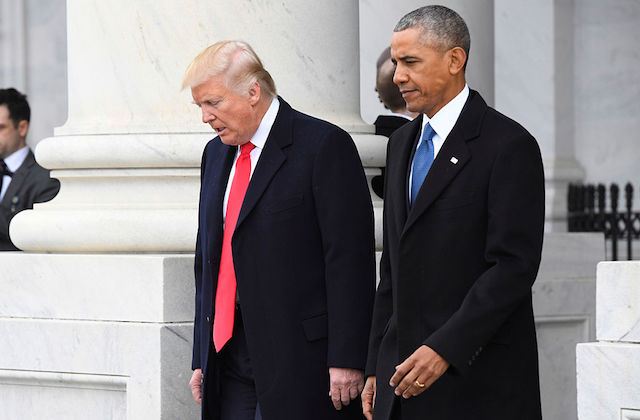Ta-Nehisi Coates’ latest essay for The Atlantic, “The First White President,” explores President Donald Trump’s tenure so far. It starts with a fact:
It is insufficient to state the obvious of Donald Trump: that he is a White man who would not be president were it not for this fact. With one immediate exception, Trump’s predecessors made their way to high office through the passive power of Whiteness—that bloody heirloom which cannot ensure mastery of all events but can conjure a tailwind for most of them. Land theft and human plunder cleared the grounds for Trump’s forefathers and barred others from it.
The four-part essay is pulled from his new book, “We Were Eight Years in Power.” It goes on to detail the ways in which Trump has uniquely employed Whiteness to dismantle the legacy of the nation’s first Black president, Barack Obama.
It is often said that Trump has no real ideology, which is not true—his ideology is White supremacy, in all its truculent and sanctimonious power.
[…]
To Trump, Whiteness is neither notional nor symbolic but is the very core of his power. In this, Trump is not singular. But whereas his forebears carried Whiteness like an ancestral talisman, Trump cracked the glowing amulet open, releasing its eldritch energies. The repercussions are striking: Trump is the first president to have served in no public capacity before ascending to his perch. But more telling, Trump is also the first president to have publicly affirmed that his daughter is a “piece of ass.” The mind seizes trying to imagine a Black man extolling the virtues of sexual assault on tape (“When you’re a star, they let you do it”), fending off multiple accusations of such assaults, immersed in multiple lawsuits for allegedly fraudulent business dealings, exhorting his followers to violence, and then strolling into the White House. But that is the point of White supremacy—to ensure that that which all others achieve with maximal effort, White people (particularly White men) achieve with minimal qualification. Barack Obama delivered to Black people the hoary message that if they work twice as hard as White people, anything is possible. But Trump’s counter is persuasive: Work half as hard as Black people, and even more is possible.
He then delves into why the very existence of Obama upsets Trump so much that it drives his policy (and his tweets):
For Trump, it almost seems that the fact of Obama, the fact of a Black president, insulted him personally. The insult intensified when Obama and Seth Meyers publicly humiliated him at the White House Correspondents’ Dinner in 2011. But the bloody heirloom ensures the last laugh. Replacing Obama is not enough—Trump has made the negation of Obama’s legacy the foundation of his own. And this too is Whiteness. “Race is an idea, not a fact,” the historian Nell Irvin Painter has written, and essential to the construct of a “White race” is the idea of not being a nigger. Before Barack Obama, niggers could be manufactured out of Sister Souljahs, Willie Hortons, and Dusky Sallys. But Donald Trump arrived in the wake of something more potent—an entire nigger presidency with nigger health care, nigger climate accords, and nigger justice reform, all of which could be targeted for destruction or redemption, thus reifying the idea of being White. Trump truly is something new—the first president whose entire political existence hinges on the fact of a Black president. And so it will not suffice to say that Trump is a White man like all the others who rose to become president. He must be called by his rightful honorific—America’s first White president.
Coates also uses the space to bust the myth that Trump’s support comes primarily from people who are resentful of their supposed economic downfall at the hands of people of color.
An analysis of exit polls conducted during the presidential primaries estimated the median household income of Trump supporters to be about $72,000. But even this lower number is almost double the median household income of African Americans, and $15,000 above the American median. Trump’s White support was not determined by income. According to Edison Research, Trump won Whites making less than $50,000 by 20 points, Whites making $50,000 to $99,999 by 28 points and Whites making $100,000 or more by 14 points. This shows that Trump assembled a broad White coalition that ran the gamut from Joe the Dishwasher to Joe the Plumber to Joe the Banker. So when White pundits cast the elevation of Trump as the handiwork of an inscrutable White working class, they are being too modest, declining to claim credit for their own economic class. Trump’s dominance among Whites across class lines is of a piece with his larger dominance across nearly every White demographic.
Coates closes with his read on what Trump’s legacy will mean for the nation:
The American tragedy now being wrought is larger than most imagine and will not end with Trump. In recent times, Whiteness as an overt political tactic has been restrained by a kind of cordiality that held that its overt invocation would scare off “moderate” Whites. This has proved to be only half true at best. Trump’s legacy will be exposing the patina of decency for what it is and revealing just how much a demagogue can get away with. It does not take much to imagine another politician, wiser in the ways of Washington and better schooled in the methodology of governance—and now liberated from the pretense of antiracist civility—doing a much more effective job than Trump.
Read the full essay here.
